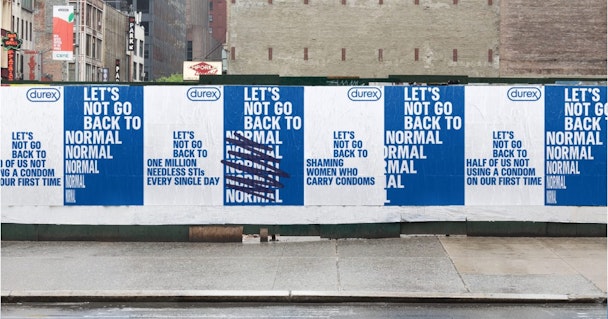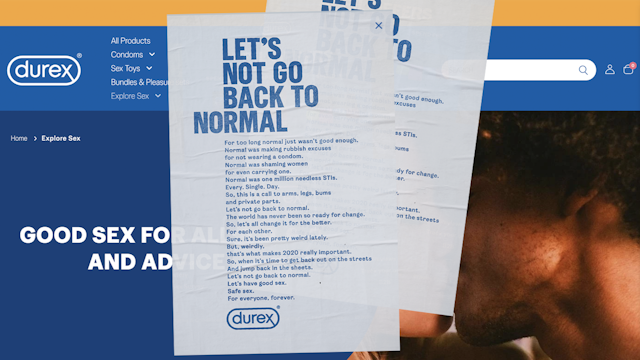Selling safe-sex: why Durex doesn’t want to go ‘back to normal’ after coronavirus
Fresh from its relaunch as a ‘sex positive’ business, Durex is marching on with its mission to rally against taboos and non-inclusive attitudes, even under lockdown. Its global brand lead explains why the condom maker is among the small throng of companies that don’t want things to go back to normal post-pandemic.

Durex's global rebrand was underpinned by a punchy manifesto and a significant digital, print and OOH campaign
Durex used to be a brand best known for its tongue-in-cheek ads – the kind that would make you stop on the street or squirm on the sofa if they appeared mid-family movie night.
In the early 2000s, it was forced to remove a series of billboards that used condoms to spell out phrases such as ‘Roger More‘, ‘Ejaculater‘ and ‘Longer Screw‘. In 2012, a TV spot for its Durex Play lubricant brand – which showed the expressions of women in the throes of sexual passion – courted complaints to the UK’s ad watchdog. In 2015, the brand took steps towards combining this playfulness with purpose, calling for the creation of official condom emojis to help young people communicate about safe-sex using symbols that weren’t hot dogs, aubergines or peaches.
Now, Durex stands for something quite different.
In February 2020, the 91-year-old Reckitt Benckiser (RB)-owned business unveiled a major new positioning and visual identity for the brand, railing against sexual taboos, stigmas and outdated, non-inclusive attitudes.
“We have a very strong purpose; we want to help people have safe sex and we want to improve sexual satisfaction,” explains Ben Wilson, sexual wellbeing global category director at RB. “Durex will always be playfully provocative… but just doing that playful, tongue-in-cheek stuff is not enough. So we’ve zeroed in on our purpose and that means we have to communicate in a different way.”
Devised by Durex’s global creative agency Havas London, the global rebrand was underpinned by a punchy manifesto and a significant digital, print and OOH campaign. Its release was informed by Durex’s 2017 Global Sex Survey, which explored attitudes towards intercourse. The main takeaway was that while the exponential growth of the internet has brought positives (including openness, discussion, exploration and access), its adverse consequences (such as loneliness, myths and confusion) have been substantial.
The turn marked a significant development in Durex’s marketing strategy and it’s one that is already seeing the brand challenge the unrepresentative and damaging sexual conventions prevalent throughout society – even in lockdown.
Love lockdown
Pandemics, unsurprisingly, are not that sexy. Despite talk of a coronavirus baby boom, Durex’s own study into sex in the time of social distancing has uncovered a series of challenges for the brand.
Its lockdown sex survey, which ran in the UK, Italy, China and South Africa, revealed a “massive drop off” in sexual occasions, says Wilson, because social distancing has prevented those who are single and couples living from getting physical. Durex’s data also shows that anxieties around health, finances and job losses are also dampening libidos. As a result, condom sales have fallen in markets like the UK.
Since people across the world were confined to their homes, the brand has remained true to its tone of voice in an authentic yet contextually appropriate way online, through partnerships with same-sex dating app Her and Tinder (which are both experiencing their own boom). The brand has also run sex therapy sessions on Zoom and used the content to create an Instagram series.
Digital messaging has included: ‘We’ve been protecting people since 1929. Now it’s your turn’; ‘Come together, apart. You don’t have to share a bed to have great sex’ and ‘Staying in doesn’t mean you can’t explore.’

“We’ve spent a lot of time trying to listen to people and respond with content that’s relevant. When lockdown happened we were one of the first brands to push the ‘Stay At Home’ message and we’ve since evolved that into areas like self-discovery and masturbation – which is the safest form of sex in lockdown.”
As countries around the world outline plans to ease lockdown restrictions and people begin to look toward some semblance of normality, Durex’s most significant lockdown push has boldly asked people not to go back to ‘normal’ when it comes to sex.
Pointing to ‘norms’ such as shaming women who carry condoms, or men not wearing them because they don’t like the ‘feel’, the brand argues that the current crisis represents a unique chance to reset what ‘normal’ looks like.
The push is being delivered across owned channels and social, as well as further executions over the coming weeks. OOH mockups have been widely shared online too.
“Pre-normal before Covid-19 was one in five women enjoying their first sexual experience. It was a million STIs every day. It was LGBTQ people feeling all sorts of anxieties and pressures. Normal was not good. So we want to challenge those conventions.”
A 'disruptive' media strategy
Like many others, Durex has been forced to shift media budgets in light of Covid-19. This has impacted product-focused pushes, which are now “irrelevant” since people are unable to access non-essential items.
“We’ve reduced, or postponed, the level of product-based comms,” reveals Wilson. “But we’ve tried to upweight the brand level comms – the ads that are challenging conventions and seeking to influence attitudes and behaviours around sex.
“We’ve really tried to dial that up across social and digital and the places people are actually spending their time. That’s been a big switch for us.”
As the world starts to emerge from lockdown, the marketer says the lessons gleaned will see the brand focus shift towards these channels.
Traditional “disruptive” channels, like OOH, will still have a major role to play in Durex’s marketing, however.
“One of the beautiful things that happened when we launched the ‘Challenge the Norm’ rebrand was that we had massive 48” by 96” sheets around London that featured a man kissing his real-life-partner.
“He posted a touching message on Instagram about how he was the person his 12 year-old self-wanted to see reflected back. That was a disruptive piece of content, it got a lot of PR and digital pick up and showed the wide and multi-channel impact outdoor can have if you’re provocative enough.”
As to how the brand will be measure its turnaround strategy over the next 12 months, Wilson says brand equity, social impact and search impact will be top of the list of KPIs.
“If we’re really challenging conventions and pushing buttons and making people have conversations about sex then that will really shine through in terms of social and search, so those are the two big things,” he adds.

